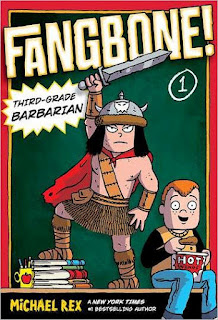
Seymour Chwast has had a long and distinguished career in art. In 1954 he co-founded the famous and influential Push Pin Studios with the all star artist team of Milton Glaser, Edward Sorel, and Reynold Ruffins. He has won numerous honors over his career, including the Augustus Saint Gaudens Award from The Cooper Union School of Art, a Gold Medal from the American Institute of Graphic Arts, and an Honorary Doctorate from Parsons School of Design. He was inducted into the Art Directors Hall of Fame in 1983. He has art pieces in many major museums, and in 2010, he published his first graphic novel, an adaptation of Dante's Divine Comedy.
In his second graphic novel, The Canterbury Tales, Chwast transforms Geoffrey Chaucer's religious pilgrims into a cadre of motorcycle riders while retaining the medieval flavor of their dress and affects. After a quick prologue and delineation of the characters and history of the book, he shares this classic collection of tales adapted into more modern words and pictures. The tales range in tenor from the blandly heroic Knight's Tale to the bawdy Miller's Tale to the ribald Wife of Bath's Tale the drily moral Parson's Tale.
Chaucer's work is a problematic one to many teachers and readers. The Middle English he used is nigh impenetrable for many high school students, more Scandinavian than Modern English. Also, the subject matter of each tale ranges far across a spectrum of taste and decorum, simultaneously depicting and commenting on class standing and humanity. Chwast condenses the complexity of each tale into a short space with an economy of text and illustration. Each tale reads simultaneously as a distillation and a modern translation. I did not get much out of this effect in this book, because without the language almost every tale devolved into a collection of fart or cuckold jokes with a moral tacked on.
Reviews of book have been mostly positive, though they tend to focus on how much the book translates the language of Chaucer into a modern vernacular, which leaves some of the original's flavor behind. Bill Baker praised it as "a spare and sparsely illustrated masterwork, one that’s as enjoyable, engrossing and richly imagined as the book upon which it is based." In a tempered critique, Kirkus Reviews wrote that it was "not quite the achievement that the Divine Comedy was, but a work that finds an artistic common denominator for Chaucer and Chwast." Publishers Weekly noted "Chwast's more bombastic approach creates an amusing surface, but doesn't really try to translate the substance of the original." Mallory Gevaert does note that despite all the flatulence and beheadings in the book, still "the whole novel feels downright classy due to Chwast’s clean art and organized storytelling."
This adaptation is published by Bloomsbury. Some preview images are available here as part of an informative interview with Bill Baker about the book.





